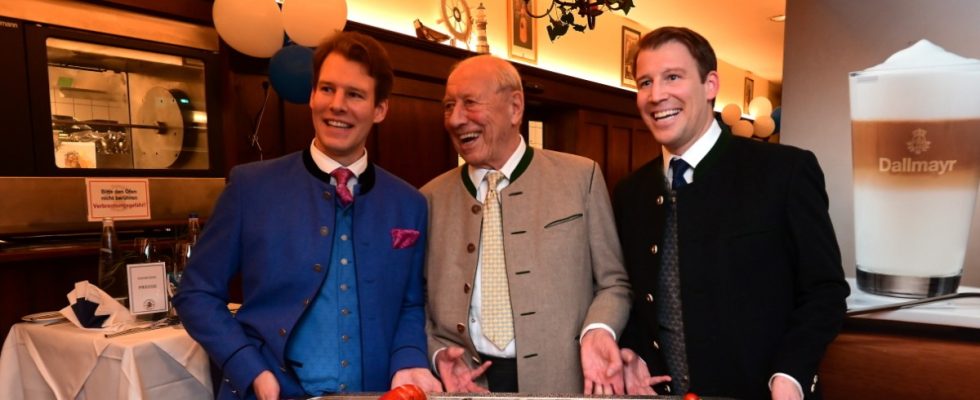“Everything stays different,” Herbert Grönemeyer once wrote – and he was right about it. For the first time in living memory – in this case almost exactly 58 years – the traditional fish dinner will take place in the Franziskaner on Ash Wednesday without a single celebrity sitting in the ever-popular student hall. Like that?
Well, because the student hall no longer exists. Torn down, gone, out, over. Phew. It’s like they don’t sell strawberries at Wimbledon anymore. Or serve the Helle as a Prussian half at the Oktoberfest. A sacrilege, isn’t it? A quick survey in the celebration group gives a clear picture: Yes, sacrilegious, absolutely. Some even find worse words. “That’s not possible, it’s a mortal sin,” complains Max Dietl, a Munich tailor and, so to speak, a neighbor of the legendary inn on Residenzstrasse. “My parents pushed me in there with the stroller. That was a piece of Munich. Anyone can build something new, but keep a tradition?” complains Dietl and speaks of the real trauma that the demolition of the beloved hall caused him.
Dietl is one of those Munich residents who actually inherited one of the coveted tables from his father for the major social event of fish dinner. For more than 50 years he always sat in the same place in the student hall: “It was like coming home. Humans are creatures of habit.” But: He is also adaptable, this person. More on that later.
What’s going on with the Franciscans anyway? For years, the more than 600-year-old inn was on the brink, so to speak, as part of the real estate portfolio of the billionaire von Finck family. In the summer of 2021, Eduard Reinbold, whom everyone just calls Edi, signed a new lease, term unknown – the Franciscan was saved. But he shrunk. Because Finck’sche Vermögensverwaltung wanted to turn part of the property into a shopping mall. Perusastraße 7 was demolished and rebuilt: the end of the student hall, where the otherwise rather shy entrepreneur Friedrich Karl Flick once celebrated wild parties and Franz Josef Strauss regularly dined in a niche from where he could see the guests, but himself remained undetected stayed. Gone, no more.
“The restaurant has recently grown by 3,000 seats within a radius of one hundred meters”
Edi Reinbold, already 81, cannot or does not want to understand all the excitement surrounding the student hall. “I don’t need the hall all year round,” he says, “instead of 800 seats, we now only have 600: not so tragic. We’re not a party place, but a restaurant. And within a hundred meters radius the restaurant has recently grown by 3,000 seats.”
“A Deadly Sin” – Max Dietl and Inge Dietl with their son Max.
(Photo: Robert Haas)
And so Reinbold adjusted the seating arrangement for the fish dinner: The Dietls – wife Inge and son Max are there as always – are now sitting at a long table in the so-called Hofgarten, under a glass dome, in the middle of hop-covered wooden arbors. Strauss’ son Franz Georg and Wiesn boss Clemens Baumgärtner have taken a seat next to Dietl. Two tables away, pharmaceutical entrepreneur Wilhelm Beier is enjoying tuna tartare, wakame seaweed salad and monkfish medallions. Over in the Fuchsenstube, Peter Ramsauer and Florian Post are speaking to the CSU -Tisch Hof, while municipal representative Kristina Frank has gathered a group of women around her. At the front of the Poststüberl, trendy host Ugo Crocamo sits in a group that has the average age well below and enthuses: “If I want to eat Bavarian food, I go to Reinbold. Or to Reinbold. Or just to Reinbold.” That’s what it sounds like, solidarity between landlords.
Once the crustaceans and champagne risotto have been removed, I ask Max Dietl how it is sitting at the new place. “It’ll be okay,” he grumbles. Gotta keep going. Or as Grönemeyer says: “Standing still is death, move forward and everything stays different.”

